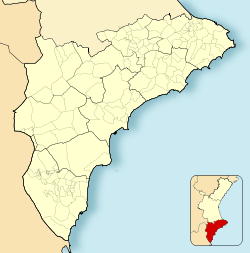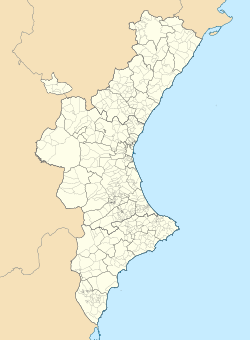
Back Guardamar del Segura AN غواردما ديل سيجورا Arabic جواردما ديل سيجورا ARZ Guardamar del Segura AST Qvardamar-del-Sequra Azerbaijani قواردامار دل سقورا AZB Guardamar del Segura Breton Guardamar del Segura Catalan Гуардамар-дель-Сегура CE Guardamar del Segura (munisipyo) CEB
Guardamar del Segura | |
|---|---|
| Coordinates: 38°5′23″N 0°39′18″W / 38.08972°N 0.65500°W | |
| Country | |
| Autonomous community | |
| Province | Alicante |
| Comarca | El Baix Segura / La Vega Baja |
| Judicial district | Torrevieja |
| Founded | 10th century |
| Government | |
| • Mayor | Carmen Verdú (2011) (PP) |
| Area | |
| • Total | 35.58 km2 (13.74 sq mi) |
| Elevation | 25 m (82 ft) |
| Population (2018)[1] | |
| • Total | 15,058 |
| • Density | 420/km2 (1,100/sq mi) |
| Demonym | Guardamarenco (m) guardamarenca (f) |
| Time zone | UTC+1 (CET) |
| • Summer (DST) | UTC+2 (CEST) |
| Postal code | 03140 and 03149 |
| Dialing code | 965 and 966 |
| Official language(s) | Spanish and Valencian |
Guardamar del Segura (Valencian pronunciation: [ˌɡwaɾðaˈmaɾ ðel seˈɣuɾa]) or briefly Guardamar is a municipality of the province of Alicante located at the mouth of the river Segura in southern Valencia (autonomous community), Spain. It is a Mediterranean resort, with a large pine forest abutting an 11-km-long white sand beach.
Historically an area of fishermen and farmers, Guardamar del Segura is the southernmost point where Valencian is spoken. A Phoenician colony, called Herna by Roman geographer Avienius in his book Ora Maritima was the first settlement near the mouth of Segura river,[2] In Spanish, "guardar" means "safekeeping" and "mar" means "sea", and this is another possible basis for its current name.
Guardamar is the southernmost Catalan-speaking town and in 1991 41.8% of the town's residents could speak it.[3] Guardamar hosts local festivals like Moros i Cristians, L'Encantà, and Fogueres de Sant Joan, which commemorate its history.
- ^ Municipal Register of Spain 2018. National Statistics Institute.
- ^ Bierling, Marilyn R. and Gitin, Seymour (2002). The Phoenicians in Spain: an archaeological review of the eighth-sixth centuries B.C.E.: a collection of articles translated from Spanish. Eisenbrauns, p. 124. ISBN 1-57506-056-6
- ^ "Fons estadístic documental - Generalitat Valenciana". www.edu.gva.es. Retrieved 20 April 2018.
© MMXXIII Rich X Search. We shall prevail. All rights reserved. Rich X Search




